Statistics Department Seminar Series: Yixin Wang, Ph.D. Candidate, Department of Statistics, Columbia University
"The Blessings of Multiple Causes"
Causal inference from observational data is a vital problem, but it comes with strong assumptions. Most methods assume that we observe all confounders, variables that affect both the causal variables and the outcome variables. But whether we have observed all confounders is a famously untestable assumption. We describe the deconfounder, a way to do causal inference from observational data allowing for unobserved confounding.
How does the deconfounder work? The deconfounder is designed for problems of multiple causal inferences: scientific studies that involve many causes whose effects are simultaneously of interest. The deconfounder uses the correlation among causes as evidence for unobserved confounders, combining unsupervised machine learning and predictive model checking to perform causal inference. We study the theoretical requirements for the deconfounder to provide unbiased causal estimates, along with its limitations and tradeoffs. We demonstrate the deconfounder on real-world data and simulation studies.
How does the deconfounder work? The deconfounder is designed for problems of multiple causal inferences: scientific studies that involve many causes whose effects are simultaneously of interest. The deconfounder uses the correlation among causes as evidence for unobserved confounders, combining unsupervised machine learning and predictive model checking to perform causal inference. We study the theoretical requirements for the deconfounder to provide unbiased causal estimates, along with its limitations and tradeoffs. We demonstrate the deconfounder on real-world data and simulation studies.
| Building: | West Hall |
|---|---|
| Website: | |
| Event Type: | Workshop / Seminar |
| Tags: | seminar |
| Source: | Happening @ Michigan from Department of Statistics, Department of Statistics Seminar Series |


